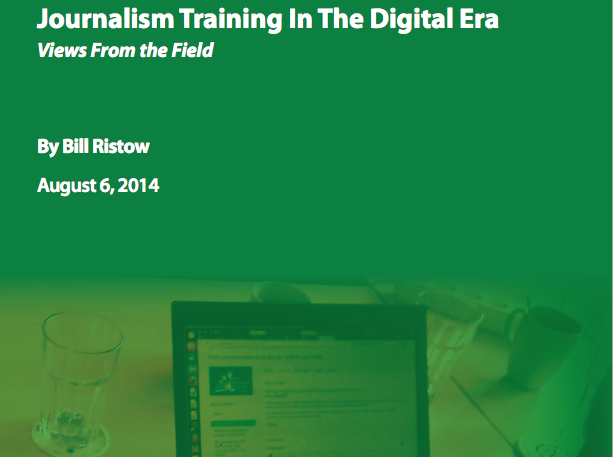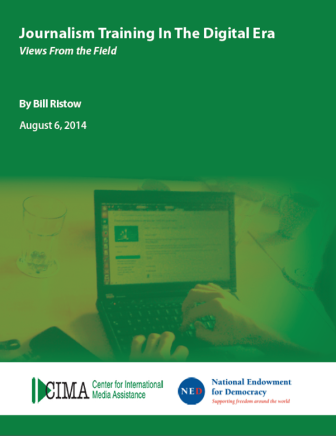

Thoughts from a Journalism Trainer
 For the past seven and one-half years, I have spent large portions of each year doing media-development work–most of it training of journalists or journalism students–in four countries of sub-Saharan Africa, and in Ukraine and Bosnia and Herzegovina.
For the past seven and one-half years, I have spent large portions of each year doing media-development work–most of it training of journalists or journalism students–in four countries of sub-Saharan Africa, and in Ukraine and Bosnia and Herzegovina.
Inevitably, my own experiences and observations about what works and what doesn’t, and what is really important in this work, have passed through my mind while researching and writing this report. None of them is unique, but it may be useful to list what I consider my three strongest lessons from nearly a dozen different training projects.
1. The projects that work best involve follow-up over a period of time. One-shot workshops, “parachute training,” can make the trainees happy, but that’s not good enough if we truly want to make a difference. Those efforts, which are still all too common, will almost never have meaningful impact. I know this from frustrating experience.
2. In his e-mail comments to me from Kampala, Peter Mwesige listed what he believes are the five most important training needs in Africa. Only the fifth item, data journalism, is even somewhat connected to the trend toward digital and social media development work. The top three items on his list: (a) Journalists need more help in understanding how big institutions (banks, government agencies, corporations) work– or don’t work. (b) Related to that, journalists need a better understanding of public policy, and to do more coverage of policy questions and options. (c) Journalists need strengthened analytical skills.
Like many trainers, I have frequently used Bill Kovach and Tom Rosensteil’s foundational book, The Elements of Journalism, focusing on its key message: “The essence of journalism is a discipline of verification.” Instilling this lesson is an uphill climb in sub-Saharan Africa and also in countries of the former Soviet Union, where journalists have not been taught to ask tough questions of authority. (Indeed, they’ve been taught exactly the reverse, and are frequently reminded of it by those in authority whenever they have the temerity to try to ask such questions.)
When I have been lucky enough to do repeated training over the years at the same media house, I have been able to concentrate on these more complex areas, and see them develop. I have also seen that even some of the most experienced journalists still need help in the areas of analytical thinking and critical analysis, and the skills of fair but challenging interviewing. For all the powers of Twitter and Facebook, and the utility of hackathons and boot camps, these skills are not likely to come from those tools.
Whatever else happens in the broad universe of media development, if an important goal of that work is to improve the conditions for democracy, it is critical to maintain a sharp, consistent, clearly stated focus on instilling and enhancing these skills of verification.
3. If you cultivate the journalism skills without attending to the business, you waste your time and effort. One of our most effective training programs, delivered at the same Ugandan media house numerous times to new audiences, and in more and more advanced forms to former audiences, is in newsroom management. On my most recent trip, I worked with a leadership team on planning how to manage the complicated transition toward cross-platform convergence. And in Ukraine, I consulted with a group of young, idealistic and talented journalists who were producing investigative story after investigative story–but were on the brink of closing down because nobody in the group knew how to hire an office manager, much less engage in fund-raising or put together a business plan.
“When we were younger, there always was this high Chinese wall between journalists and the money people, advertising–and now I’m not sure that was altogether a good thing,” Lisa Schnellinger told me, and she’s right: It’s important to help journalists understand that this is a business, even if it’s a nonprofit business, and give them the skills to build the structures that will keep their enterprises alive.
The media-development community must not ignore the digital explosion and its ramifications, as too many U.S. media outlets did. But its funders, and its practitioners, must also make sure of two things: First, keep the focus on content, not on platform, and do not allow the evolution to important new forms of training to result in a net loss in development work that will help journalists learn the skills of verification. And second, expand programs to help independent media houses gain the management and business skills that will make them more likely to survive.
 Bill Ristow is a journalist and international journalism trainer based in Seattle, WA. After a 23-year career at the Seattle Times, where he served as metro editor and features editor, he has trained journalists and students in Uganda, Ethiopia, Kenya, Ukraine, Bosnia, and, as a Fulbright Scholar, in Ghana.
Bill Ristow is a journalist and international journalism trainer based in Seattle, WA. After a 23-year career at the Seattle Times, where he served as metro editor and features editor, he has trained journalists and students in Uganda, Ethiopia, Kenya, Ukraine, Bosnia, and, as a Fulbright Scholar, in Ghana.









